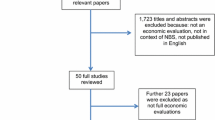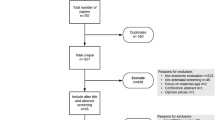Abstract
Economic evaluation supports decision making in health care in view of alternative courses of action and limited resources. It aims at providing maximum benefit in relation to invested resources. In the context of screening, it is required from an economical viewpoint that the cost of case finding, including confirmatory diagnostic tests and treatment, should be economically balanced in relation to possible expenditure on medical care as a whole. Costs of false-positive findings are crucial in newborn screening and pertain to direct costs (e.g. necessary diagnostic work-up), indirect costs (e.g. absence from work of parents) and intangible costs (e.g. anxiety and distress caused, stigmatisation).



Similar content being viewed by others
Abbreviations
- CBA :
-
cost-benefit analyses
- CEA :
-
cost-effectiveness analyses
- CMA :
-
cost-minimisation analyses
- COI :
-
cost-of-illness studies
- PKU :
-
phenylketonuria
- QALY :
-
quality-adjusted life years
References
Banta HD, Luce BR (1993) Health care technology and its assessment. An international perspective. Oxford University Press, Oxford
Drummond MF, Stoddart GL, Torrance GW (1998) Methods for the economic evaluation of health care programmes. Oxford University Press, Oxford
Gold MR, Siegel JE, Russell LB, Weinstein MC (1996) Cost-effectiveness in health and medicine. Oxford University Press, New York
Insinga RP, Laessig RH, Hoffman GL (2002) Newborn screening with tandem mass spectrometry: examining its cost-effectiveness in the Wisconsin Newborn Screening Panel. J Pediatr 141: 524–531
Lord J, Thomason MJ, Littlejohns P, Chalmers RA, Bain MD, Addison GM, Wilcox AH, Seymour CA (1999) Secondary analysis of economic data: a review of cost-benefit studies of neonatal screening for phenylketonuria. J Epidemiol Community Health 53: 179–186
Murray CJL, Lopez AD (1996) The global burden of disease. World Health Organization, Geneva
Pollitt RJ, Green A, McCabe CJ, Booth A, Cooper NJ, Leonard JV, Nicholl J, Nicholson P, Tunaley JR, Virdi NK (1997) Neonatal screening for inborn errors of metabolism: cost, yield and outcome. Health Technology Assessment 1: 1–202
Schoen EJ, Baker JC, Colby CJ, To TT (2002) Cost-benefit analysis of universal tandem mass spectrometry for newborn screening. Pediatrics 110: 781–786
WHO (2000) The World Health Report 2000. Health systems: improving performance. World Health Organization, Geneva
Author information
Authors and Affiliations
Corresponding author
Rights and permissions
About this article
Cite this article
Wildner, M. Health economic issues of screening programmes. Eur J Pediatr 162 (Suppl 1), S5–S7 (2003). https://doi.org/10.1007/s00431-003-1341-5
Published:
Issue Date:
DOI: https://doi.org/10.1007/s00431-003-1341-5




